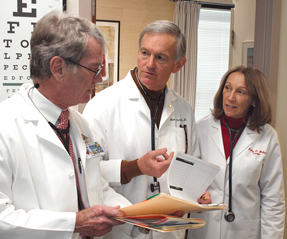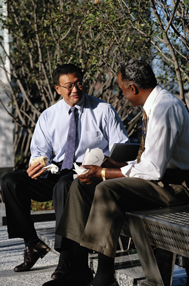Practice achieves NCQA's highest recognition without an EMR
An internal medicine practice followed evidence-based diabetes care guidelines and achieve honors from the National Committee on Quality Assurance, despite not yet having an electronic medical record. A lot of thinking and a dedicated team went into how the group's paperwork was able to accomplish the same goals.
Where: Mobile Diagnostic Center, Mobile, Ala.
The issue: Adopting a patient-centered medical home (PCMH) model without the use of an electronic medical record (EMR) system
Background

The Mobile Diagnostic Center has 22 primary care and specialty physicians and five nurse practitioners. The group's decision to transform to a PCMH and apply for recognition from the National Committee for Quality Assurance (NCQA) grew from an annual ACP gathering of Alabama physicians in Washington, D.C., two years ago.
“We discussed the pilot projects going on around the country,” said Robert W. Israel, FACP. “When we got back, the head of our practice got in touch with Blue Cross.” Blue Cross and Blue Shield of Alabama was in the process of establishing a medical home pilot program and selected Mobile Diagnostic Center as one of 11 primary care practices that would launch the first phase of the program in late 2009.
Mobile Diagnostic Center does not have an EMR. While the NCQA does not require that a practice use an EMR in its transformation to the PCMH model, one of the nine standards in the application is “advanced electronic communications.” To achieve Level 3, the highest level of recognition, a practice without an EMR must score enough points in the eight other categories and meet benchmarks in all 10 must-pass elements (more information about requirements for recognition is available online.
“We didn't choose to seek Level 3 without an EMR on purpose,” said James L. Walker, FACP, vice president of quality at Providence Hospital and director of Mobile Diagnostic Center. “We just haven't found a system that we really like yet.”
How it works
Seven internists already certified through the NCQA's Diabetes Recognition Program were selected to pilot the transformation to the PCMH model. In addition, the group selected three chronic conditions frequently seen in the practice, diabetes, hyperlipidemia and congestive heart failure, to meet Blue Cross and NCQA requirements. The physicians would need to show that they follow evidence-based guidelines in the treatment of all patients with a targeted condition.
“Our PCMH team, physicians and nurses, met on a weekly basis to go through each point of the application and discuss whether we're already doing what's required, if so can we prove it, and if not how do we best approach it,” said Kathy Walker, CRNP, DNP. “A great deal of our work involved designing new forms that the physicians would use for all their patients.”
For example, the practice chose to document Healthcare Effectiveness Data and Information Set guidelines for diabetes. Records for patients with diabetes include a form listing each guideline, with a space to indicate the date an eye or foot exam was performed, for example, or the date and results for lipid or A1C tests.
In addition to new forms for each targeted chronic condition, the group created a six-page medical history form and another that helps physicians track preventive measures such as vaccinations and colonoscopies.
“It was harder to document our practices with paper than it would have been with an EMR,” Ms. Walker said. “A computer would automatically collect and save the data for NCQA. We had to do it all by hand, and then scan our papers so we could send PDFs with our application.”
The group began e-prescribing as part of the transformation, although a sheet listing the medications each patient takes is kept with the patient's chart. The practice uses a TeleVox Software service to telephone patients two days prior to scheduled appointments; the patient has the option to confirm or cancel. An automated care coordination tool from Phytel, Inc., scans billing data, locates patients with selected chronic conditions (using the diagnosis code), and calls those patients to remind them when they need to schedule a follow-up visit.
The challenges
Time was the key challenge. “When a patient fills out a six-page history form, it takes the physician twice as long to see the patient,” Ms. Walker said. “The nurses had to learn e-prescribing, as well as an Excel spreadsheet we created to track when tests were done, when we got results back and when we notified the patient.”
“It would have been a financial challenge if we hadn't had Blue Cross support,” Dr. Walker said. “They gave us $5,000 in seed money, and I don't think it would have happened without money coming from somewhere.”
Results
Mobile Diagnostic Center and the seven individual physicians achieved Level III recognition in September 2010, seven months after they began the process. Although outcome data are not part of the NCQA application, Ms. Walker said the seven physicians administered preventive vaccinations at 2.5 times their previous rate during the transformation and improved their use of evidence-based guidelines for diabetes by 15%.
Lessons learned
“The more supporting information you give NCQA the better,” said Ms. Walker. “We probably provided 10 to 12 pieces of data where three were required. Also, you must have people who are dedicated to getting through the application process, because at first, your staff may perceive change as adding to their burden.”
How patients benefit
The new, longer history form, which met with some resistance from patients and physicians, has yielded benefits for both. “A lot of these patients I've been seeing for 10 or 20 years, when we asked them to do this extensive history, I'd discover something important I didn't know about that patient,” Dr. Walker said. When patients complete the form and rethink their history, they become more involved in their own care as a result, Dr. Israel asserted.
“They know that it matters that they take their ACE inhibitor, that they get their colonoscopy done on time,” he said. “I think there's been buy-in on the patient side as well, so they're now a partner in their own health care.”
Next steps
“We'd like to expand this to all our physicians,” said Dr. Walker. “All may not want to do it because they don't like change, or it's too much computation. But I think evidence-based medicine is the future.”
Words of wisdom
“Some of us like looking at a chart and holding it in our hands, so it's absolutely feasible to achieve Level 3 without an EMR,” said Ms. Walker, “as long as you have a dedicated team.”




